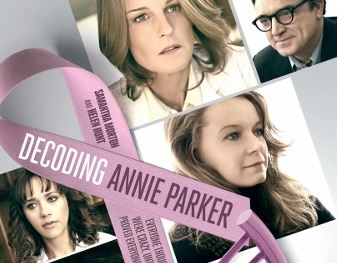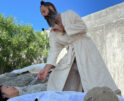
On the Big Screen Today: Another Woman Leads
Interview with Three-Time Cancer Survivor, Annie Parker
Life is precious, and so is what we choose to do with our time… for we do not know how much longer we have left in this world (or so they say).
Mary-Claire King was 15 years old when her best friend died from Cancer; an early lesson of how precious each day is. Still, King went ahead and gave more than 17 years of her time to researching a gene for cancer before finally discovering chromosome 17.
According to the American Cancer Society, 1 in 3 women have a risk of developing cancer, and 1 in 5 women risk dying from the illness. Formally named “BRCA1,” chromosome 17 is a revolutionary discovery because it allows specific individuals to know they have a higher risk of illness, and enables doctors to take better preventative care toward treating them.
King’s extraordinary influence on genetics comes from more than her hard work; her success is the result of relentless faith and optimism. “I was a young woman, not a physician,” says King, who recalls the time when, “people completely ignored me.” King also recalls, “an active opposition from some groups” who considered her research a waste of effort.
Annie Parker is one of many women who can vouch personally that King’s work is no wasted effort. Parker knew long before there was evidence that cancer in fact has a genetic link. After her mom and sister died from the illness, Parker took it as no surprise when she later developed cancer herself, which she has battled three times before surviving today as cancer-free.
Unfortunately, Parker, like King, had difficulty being taken seriously by members of the medical community, and expresses “cancer was such a closet disease. Nobody wanted to talk about it.” Parker promised herself, “If I got through all these cancers I wanted to educate people and provide the tools to start the communication… to tell their GP (general practitioner) they have had a history of cancer in their family and hopefully at that point, doctors will take notice and be a little more aware and perform earlier mammograms on these people.”
Parker’s dream of using her experience to inspire others is now being fulfilled: her story comes out in theaters across the nation today, and is told through a star studded cast, including: Samantha Morton, Helen Hunt, Aaron Paul, and Rashida Jones. The film has been written, produced, and directed by Steven Bernstein to show what Parker describes as a 75% accurate depiction of her life. For a behind the scenes, click here.
‘Decoding Annie Parker’ brilliantly paints humor into an otherwise depressing subject; it articulates a lighter side to life that seems ever-present amidst our superficial worries when it illustrates irony to reveal joy beneath human struggles. For instance, there is the true-to-life opening scene when Parker’s husband gets introduced as a sexy 60s rock-star who also cleans pools for a living… in one of the more freezing parts of Canada. Before we can decide whether to laugh, pity, or feel jealousy of Parker, the film moves us to her mother’s death.
Parker relates from her real life that, “when my mom passed from her secondary cancer, I didn’t even know about her breast cancer; she actually had breast cancer when she was pregnant with me.” Parker recalls in awe that her mom “knew she had breast cancer, but she chose not to do anything about her health until after she had me.”
When asked what she did to find optimism, Parker laughs and responds “it was a bit of an obsession for me. It was what kept me sane; I had to keep going until I found what cancer was all about.” She says, “I had lost a lot of my faith because it seemed all my family and everyone I loved was passing away from this horrific disease and it wasn’t just bad luck, as we found out years ago when Dr. King made the connection” she laughs even harder.
Parker also recalls the producer saying, “We have to add a little bit of humor; we have to make sure people do not leave the theater in total tears,” though she laughs, admitting “I have a bit of a sarcastic sense of humor, which of course did help me with a lot of my cancers.” One such example of Parker’s humor is a scene omitted from the movie when she was asked to leave a wig shop: “I went in trying on all these wigs; I tried on the Cher wig and started to perform a little bit like Cher would perform,” and the woman selling the wigs did not like it, so “I said ‘I’m going through chemotherapy right now,’ and she said ‘well this is not how you should be acting’ and I responded ‘well how should I be acting!?’”
When asked how her life has been changed from cancer, she recalls “it’s a real personal story with me, and it kind of relates back to my sister.” Parker remembers “when I had my ovarian cancer and I was very sick and very thin and very gone and with no hair… I remember looking at myself in the mirror and the image that was looking back at me was the image of my sister. For the first time I gasped because I thought, now I see how I kind of look like Jonie, and it wasn’t a pretty image. It was one of those moments in 12 months of chemotherapy when I thought look at me, I look so ill and gone and old and I just decided at that point that it wasn’t going to kill me; I was gonna fight, and I was gonna fight hard. I promised God I was going to give back and I was going to fight this.”
Parker, who survives cancer three times, after witnessing her mother and sister die from the illness asks “if you don’t look in the mirror and laugh at yourself some days, what’s the point?”
“Don’t give up the fight; I am proof that you can survive everything,” she says. “I certainly believe when your time comes your time comes, but when you are here on Earth you have to keep going,” she adds, and her voice oozes with sincerity as she thanks me for caring and taking some time to hear her story.
By Mica Kelmachter
Recommended
-
The Power Of Saying “No” W...March 22nd, 2024
-
Is It Time To Change Your Rela...March 20th, 2024
-
What’s Your Legacy?December 18th, 2023
-
Be Here Now—Two Easy StepsSeptember 19th, 2023
-
16 Questions To Ask Yourself T...May 16th, 2023















